Brown Collection- 75. Lord Lovel
[Abrams Collection "Lord Lover" from Betty Bostic taken from G. L. Bostic her grandmother. Also recorded.]
OLDER BALLADS MOSTLY BRITISH
Lord Lovel (Child 75)
Possibly it is the very simplicity of the sentiment that has made this ballad so persistent a favorite; certainly it has little else (unless, perhaps, the tune) to commend it. For its range since Child's time, both in the old country and in America, see BSM 52. To the texts there listed should be added Kentucky (BTFLS iii 92), Tennessee (SFLQ xi 124-5), North Carolina (FSRA 27-8), Florida (SFLQ viii 150-2), Missouri (OFS i 113-15). Ohio (BSO 39-45), Indiana (BSI 79-91), and Michigan (BSSM 27-8). The texts vary but little, going back, perhaps in all cases, to a London broadside of a hundred years ago, Child's H. To the variations in the name of the church whose bells announce the death of the lady, some of which are listed in BSM, North Carolina adds one more, "St. Banner's" (version B below). For the most part the church is not named in the North Carolina texts; Lord Lovel returns to "Cruel Clark's" (A), to "London Tower" (C), to "London town" (D F G) and hears the bells, but the church is not named. For an adaptation to the purposes of political satire during the Civil War, see volume 111, section ix.
The texts are so much alike that only a few are given in extenso.
A. "Lord Lovinder.' From the John Bell Henneman collection, made about the beginning of this century; where, does not appear, but somewhere in North Carolina.
1 Lord Lovinder at the stable door
Rubbing down his steed.
Up steps Lizzie le Dunciebell:
'Lord Lovinder, I wish you much speed.
2 'My father is an angry man,
He has made one solemn vow:
True lovers' own heart's blood to see,
. . . . . . .
3 'Well. I will go to Prince Harry's land
And there I will remain.
At the end of seven long years
I'll turn unto you again, my love.'
4 'Too long, too long, Lord Loving,' she said,
'Too long to dwell alone.
. . . . . .
. . . . . .
5 He hadn't been in Prince Henry's land
But space but half a year
Before strange dreams run into his mind;
He thought on's love behind.
6 He called to his awaiting boy
To bring his milk-white steed.
Also unto his little foot-page
To bring him his bridle range.[1]
7 He rode, he rode till he came to Cruel Clarks, [2]
He asked how came strange bells to ring.
'They ring for Lizzie le Dunciebell,
An own true lover of thine.'
8 He put his foot in the last stirrup.
Looking on every side;
There he spied six lily-white maids
Burying his own true bride.
9 'Oh. take her up, you lily-white maids,
Oh. take her up,' says he.
'That I may make one solemn vow
Never to kiss none but she.'
10. First he kissed her red rosy lips
At last he kissed her chin
. . . . .
Where all his delight lay in.
11 'O mother, dear mother, make my bed of sorrow,
. . . . .
For I shall die tomorrow.'
12 They buried 'em both in the new church yard
. . . . .
Out of her breast there sprung a red rose,
Out of his a brier.
13 They grew, they grew till they got to the top of the palings,
They grew, they grew till they got together
And there they remained for ever.
1. Probably for "reins."
2. This may be a corruption of some name of a church, but what name the editor is unable to guess.
B. 'Lord Lovel and Lady Nancy.' Communicated, with the tune, by Madge Nichols, a freshman at Trinity College about thirty years ago. Her text is much closer to the standard broadside text than Henneman's, but it has "St. Banner's bell" instead of "St. Pancras bells."
C. 'Lord Lovel.' Communicated by R. Frank Brower of Durham in 1916. Given here as a representative text.
1 Lord Lovel stood at the castle gate
A-slicking his milk-white horse.
When in came Lady Nancy Bell
A-wishing her lover good speed speed speed,
A-wishing her lover good speed.
(Repeat thus the end of each stanza)
2 'Oh, where are you going, Lord Lovel?' said she,
'Oh, where are you going?' said she.
. . . . . .
'Far countries for to see.'
3 'When will you be back, Lord Lovel?' said she,
'When will you come to me?'
'In a year and a day, or three at least,
I'll return to my fair Nancy.'
4. He hadn't been gone but a year and a day
Far countries for to see.
When languishing thoughts came on his mind
'Lady Nancy I must go to see.'
5. He rode and he rode on his milk-white horse
Till he came to London Tower
. . . . .
And the people all mourning around.
6 He ordered the coffin to be opened wide
And the shroud should be undone;
And on his white pocket handkerchief
The tears came trickling down.
7 Lady Nancy she died as it were on today,
Lord Lovel he died on tomorrow.
Lady Nancy she died of a broken heart,
Lord Lovel he died of sorrow.
8 Lady Nancy was laid in the high churchyard.
Lord Lovel was laid in the tower.
And out of her grave there grew a red rose
And out of Lord Lovel's grew a brier.
9 It grew and it grew to the church steeple top,
It grew till it could grow no higher.
They twingled and twined in a true lovers' knot
For all true lovers to admire, mire, mire,
For all true lovers to admire.
D. 'Lord Level.' As sung for Mrs. Sutton by Mrs. Becky Gordon of Cat's Head, Saluda Mountain, Henderson county, in 1920 or thereabouts. Again a representative text, with the opening of the coffin and the kissing of her clay-cold lips, but without the rose-and-brier ending. In her account of getting it Mrs. Sutton gives a most interesting picture of the region and especially of the ruins of a fine place built before the Civil War, when the South Carolina planters used to come up to this mountain country for the hot weather. Mrs. Sutton notes that the song was sung also by "Aunt Nancy Coffey, who lived in the Grandfather section of Caldwell," with the addition of a stanza after Lord Loven (as Aunt Nancy called him) tells how long he will be gone:
'That's fur too long,' Lady Nancybelle said,
'That's fur too long.' said she.
'You're apt to furget Lady Nancybelle
And take up with some other lady.'
Aunt Nancy took a pessimistic view of the other sex.
E. 'Lord Lovel.' Another text of Mrs. Sutton's finding, sung this time by Mrs. Farthing of Beech Creek, Watauga county, who traced it back as a family memory to Revolutionary times. Upon Lord Lovel's query as to why Lady Nancy died, Mrs. Farthing commented : "He knew why she died. He just axed that to fool people. I bet he married somebody else in three months." This version lacks the closing stanzas, ending with Lord Lovel's query and the people's answer. One stanza is perhaps worth quoting:
Lord Lovel he stayed one year and a day,
One year and a day stayed he,
When tired and worn, with a broke down steed,
He came to his native countree.
F. 'Lord Lovel.' Contributed by Otis Kuykendall of Asheville in 1939. Eight stanzas. Lacks the rose-and-brier ending.
G. 'Lord Lovel.' Sent in by Charles Boyd Skinner of Duke University in 1941 as sung by his grandmother "70 years ago." Nine stanzas, ending with the rose-and-brier formula.
-----------------------------------------
21. Lord Lovel (Music)
B. 'Lord Level and Lady Nancy.' Sung by Miss Madge Nichols. Recorded at Trinity College, Durham, in the early 1920's. The first four measures could well pass as variation of Mrs. James York's 'Fair Margaret and Sweet William' (20I) as well as her 'The Seven Sisters' (2B i). Our text resembles the third stanza of the C version.
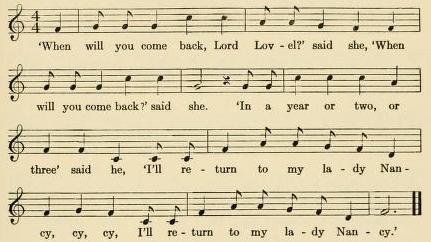
For melodic relationship cf. **OFS i 112, No. 16C; our measures 6-7 with FSRA 27, No. II, measures 2-3.
Scale: Mode III, plagal. Tonal Center: f. Structure: aa1bcc1 (2,2,2,2,2) = ab (4,6) ; b is terminally incremented.
C. 'Lord Lovel.' Sung by Mrs. Myra Bamett Miller. Recorded probably at Lenoir, August 1939, 1940, or 1941. This tune reminds one very much of some Bavarian or Alpine peasant dance.


Scale: Pentachordal. Tonal Center: c. Structure: aba1b (2,2,2,2) = aa1 (4,4).
C(I) 'Lord Lovel.' Sung by Mrs. G. L. Bostic. Recorded at Boiling Springs, P. O. Mooresboro, Cleveland county, August 7, 1939. Another title is 'Lord Lover.'
%20f.jpg)
Scale : (4,6). Hexatonic (4). Tonal Center: c. Structure: aa^abb (2,2,2,2,2) = aai
F. 'Lord Lovel.' Sung by Otis Kuykendall. Recorded at Asheville in 1939. This melody is a fine example to show what can be done with a minimum of investment.
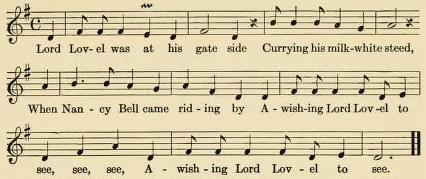
For melodic relationship cf. **SharpK i 146, No. 21 A, general melodic trend; FSF 273, No. 158A, measures 3-4.
Scale: Hexachordal. Tonal Center: d. Structure: aa1a1bbi (2,2,2,2,2).
H. 'Lord Lovel.' Sung by anonymous singer. Recorded in August 1939, 1940, or 1941. No place given. Melodically related to Mrs. James York's 'The Seven Sisters' 2B ; also very similar to the Nichols version, 21 B.
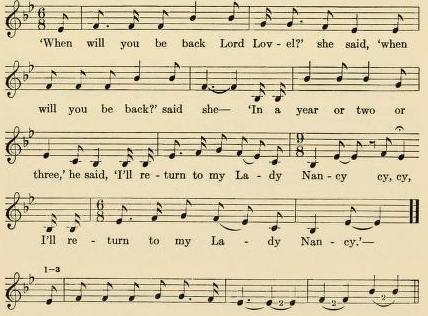

Scale: Mode III, plagal. Tonal Center: e-flat. Structure: aa1bcc1 (2,2,2,2,2)= mm1n (2,2,6) = barform ; the n is terminally incremented.
I. 'Lord Lovel.' Sung by Mrs. Henry S. Hanford. Recorded at Chapel Hill. Set down by Professor J. H. Hanford, May 3, 1915. [The text is given in Eddy D; Ballads and Songs from Ohio, 1939]
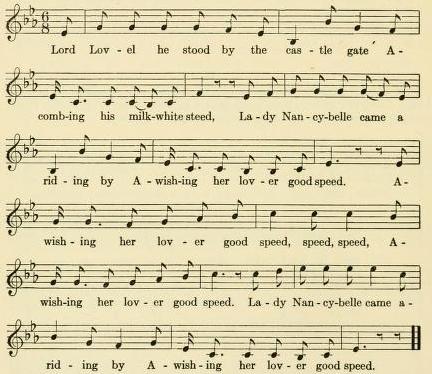
For melodic relationship cf. ***BSO 41, No. 13D.
Scale: Heptachordal. Tonal Center: e-flat. Structure: aa1bb1a2 (4,4,2,2,4).
J. 'Lord Lovel.' Sung by Mrs. Nora Hicks. Recorded at Mast's Gap, Sugar Grove, Watauga county, in September 1940.
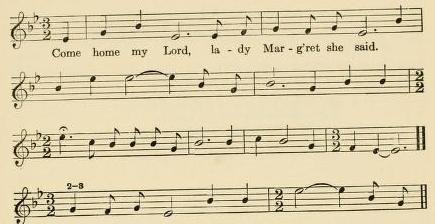
F C Brown says: "More like Earl Brand." Not much of the text can be understood owing to poor recording, but in the last stanza there is a distinct "Lord Lovel."
For melodic relationship cf. **SharpK i 146, No. 21A, basic melodic tendency in first four measures; BT 108; SCB 122; WSSU 177, 3a; ASb 70; FSoA 124; BSO 43, No. 13E, measures 1-2.
Scale: Mode III. Tonal Center: e-flat. Structure: abbk (2,2,2,2) = ab (4,4)-